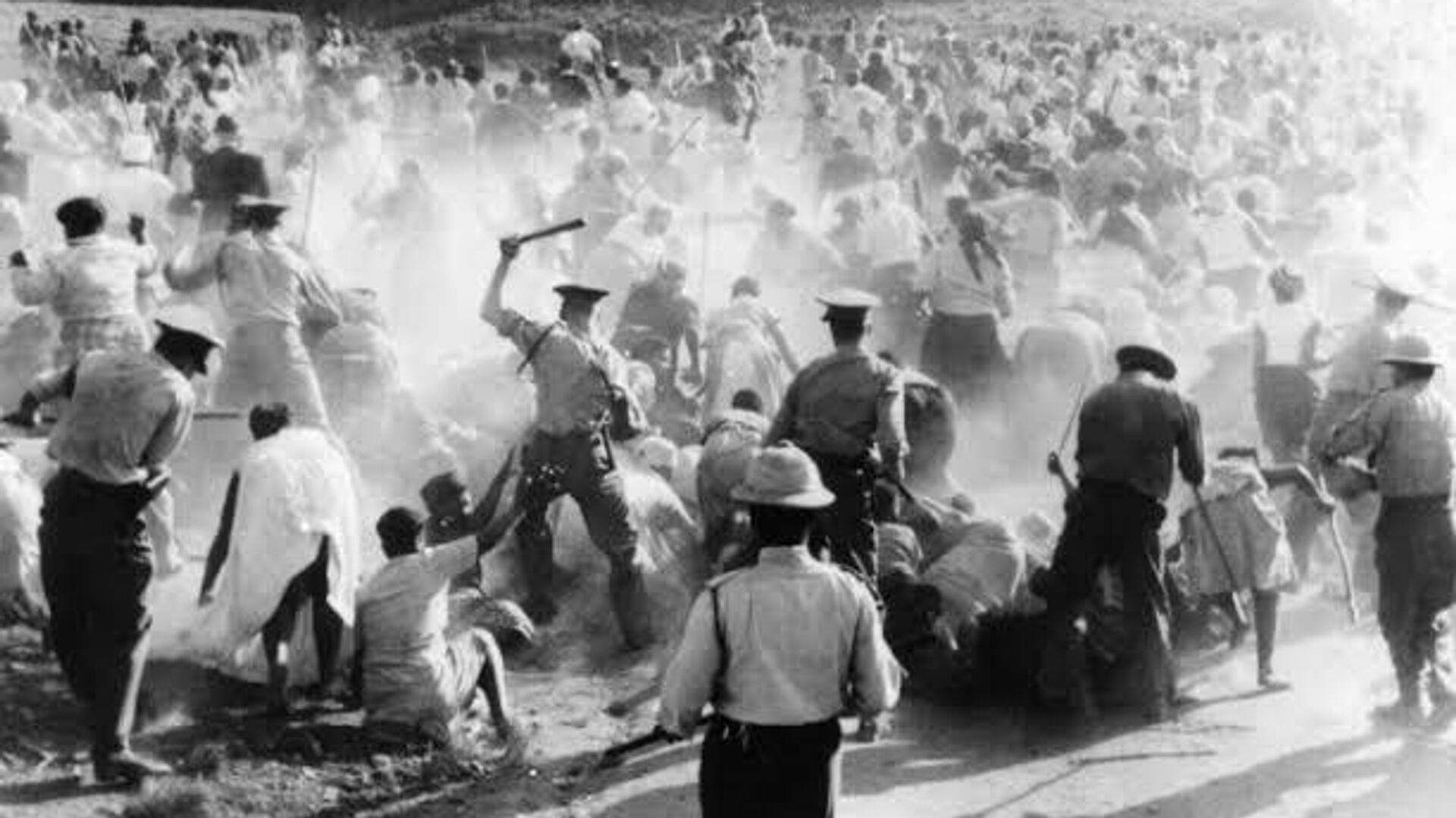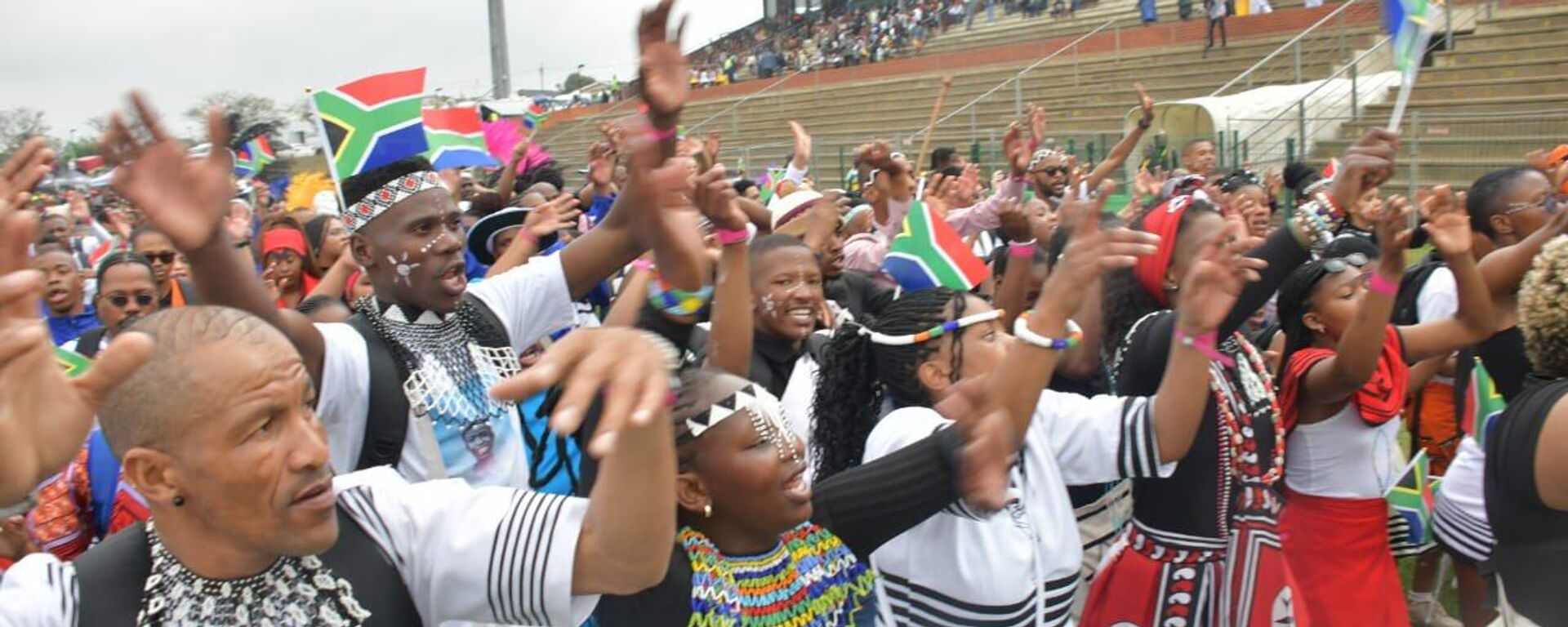https://en.sputniknews.africa/20240321/64-years-since-sharpeville-massacre-south-africa-celebrates-human-rights-day-1065667485.html
64 Years Since Sharpeville Massacre: South Africa Celebrates Human Rights Day
64 Years Since Sharpeville Massacre: South Africa Celebrates Human Rights Day
Sputnik Africa
When South Africa held its first democratic elections and elected Nelson Mandela as its first democratic president, March 21 was officially declared Human... 21.03.2024, Sputnik Africa
2024-03-21T18:04+0100
2024-03-21T18:04+0100
2024-03-22T08:10+0100
sub-saharan africa
south africa
southern africa
cyril ramaphosa
nelson mandela
apartheid
anti-apartheid struggle
human rights
holidays
national holiday
https://cdn1.img.sputniknews.africa/img/07e8/03/15/1065668351_0:79:612:423_1920x0_80_0_0_25d9d4f79161fd2913afe0fdfc3d51fd.jpg
Human Rights Day in South Africa is historically linked to March 21, 1960 and the events in Sharpeville when 69 people were killed and 180 injured when police opened fire on a peaceful crowd gathered to protest the pass laws. The discriminatory law, enacted by the apartheid government, required black South Africans to carry a passbook with their details, including a permit to stay in an urban area, at all times, and they were punished for failing to do so.After the Sharpeville massacre, a number of black political movements were banned by the apartheid government, but the resistance movement continued to operate underground and eventually society achieved the collapse of apartheid in 1994.Speaking on Human Rights Day on Thursday, South African President Cyril Ramaphosa assessed the events in Sharpeville, saying the nation still remembers those who fell for rights "with sorrow."He added that Sharpeville "bore witness to one of the worst atrocities committed by the apartheid regime against the South African people." The president also laid wreaths at the Sharpeville Memorial in honor of those who sacrificed their lives to fight for South Africa's rights and democracy.As noted by the government, Ramaphosa's speech is also timed to coincide with the 30th anniversary of freedom and democracy, and is held under the theme "Three Decades of Respect for and Promotion of Human Rights."On Human Rights Day, the South African Parliament called on all the citizens to reflect, protect and defend the gains the nation has made as a country with human rights. The parliament added that it is proud of the achievements of South Africans in passing progressive laws that have changed the face of society "from a people tormented by inhumane apartheid laws to a society that proudly affirms human rights and equality for all."The statement added that in the past year, parliament has passed a number of important laws securing the rights of South Africans in areas such as access to quality healthcare for all, the rights of people with disabilities, and reaffirmed its status as a defender of human rights by taking a landmark case to the International Court of Justice over Israel's actions in Gaza.
https://en.sputniknews.africa/20230924/south-africas-heritage-day-celebrating-cultural-diversity-of-rainbow-nation-1062320520.html
south africa
southern africa
Sputnik Africa
feedback@sputniknews.com
+74956456601
MIA „Rossiya Segodnya“
2024
Maxim Grishenkin
https://cdn1.img.sputniknews.africa/img/07e7/0a/17/1063018107_0:0:1104:1103_100x100_80_0_0_03090c85a11f5d2e8a19cf1d989443c9.jpg
Maxim Grishenkin
https://cdn1.img.sputniknews.africa/img/07e7/0a/17/1063018107_0:0:1104:1103_100x100_80_0_0_03090c85a11f5d2e8a19cf1d989443c9.jpg
News
en_EN
Sputnik Africa
feedback@sputniknews.com
+74956456601
MIA „Rossiya Segodnya“
Sputnik Africa
feedback@sputniknews.com
+74956456601
MIA „Rossiya Segodnya“
Maxim Grishenkin
https://cdn1.img.sputniknews.africa/img/07e7/0a/17/1063018107_0:0:1104:1103_100x100_80_0_0_03090c85a11f5d2e8a19cf1d989443c9.jpg
south africa, southern africa, cyril ramaphosa, nelson mandela, apartheid, anti-apartheid struggle, human rights, holidays, national holiday, history
south africa, southern africa, cyril ramaphosa, nelson mandela, apartheid, anti-apartheid struggle, human rights, holidays, national holiday, history
64 Years Since Sharpeville Massacre: South Africa Celebrates Human Rights Day
18:04 21.03.2024 (Updated: 08:10 22.03.2024) When South Africa held its first democratic elections and elected Nelson Mandela as its first democratic president, March 21 was officially declared Human Rights Day as a public holiday to recognize the ordinary people who had risen up to claim their rights and fight against the injustices of apartheid.
Human Rights Day in South Africa is historically linked to March 21, 1960 and the events in Sharpeville when 69 people were killed and 180 injured when police opened fire on a peaceful crowd gathered to protest the pass laws.
The discriminatory law, enacted by the apartheid government, required black South Africans to carry a passbook with their details, including a permit to stay in an urban area, at all times, and they were punished for failing to do so.
The Pan-Africanist Congress proposed an anti-pass campaign on March 21, 1960. Black men gathered in Sharpeville without passes and presented themselves for arrest. An order to disperse was given and the police opened fire on the crowd of men, women and children.
After the Sharpeville massacre, a number of black political movements were banned by the apartheid government, but the resistance movement continued to operate underground and eventually society achieved the collapse of apartheid in 1994.
Speaking on Human Rights Day on Thursday, South African President Cyril Ramaphosa assessed the events in Sharpeville, saying the nation still remembers those who fell for rights "with sorrow."
"And although many decades have passed, we still remember with great sorrow and pain the 69 people who were killed and the many more who were maimed as they protested in peace against the grave injustices imposed upon them," the leader said.
He added that Sharpeville "bore witness to one of the worst atrocities committed by the apartheid regime against
the South African people." The president also laid wreaths at the Sharpeville Memorial in honor of those who sacrificed their lives to fight for South Africa's rights and democracy.
As noted by the government, Ramaphosa's speech is also timed to coincide with the 30th anniversary of freedom and democracy, and is held under the theme "Three Decades of Respect for and Promotion of Human Rights."
On Human Rights Day, the South African Parliament called on all the citizens to reflect, protect and defend
the gains the nation has made as a country with human rights.
"This day marks an affirmation by ordinary people, rising in unison to proclaim their rights. It became an iconic date in our country’s history that we commemorate as Human Rights Day every year to remind us how far we have come for these hard-won rights and the cost many had paid," the legislators said.
The parliament added that it is proud of the achievements of South Africans in passing progressive laws that have changed the face of society "from a people tormented by inhumane apartheid laws to a society that proudly affirms human rights and equality for all."
The statement added that in the past year, parliament has passed a number of important laws securing the rights of South Africans in areas such as access to quality healthcare for all, the rights of people with disabilities, and reaffirmed its status as a defender of human rights by taking a landmark case to the International Court of Justice
over Israel's actions in Gaza.



